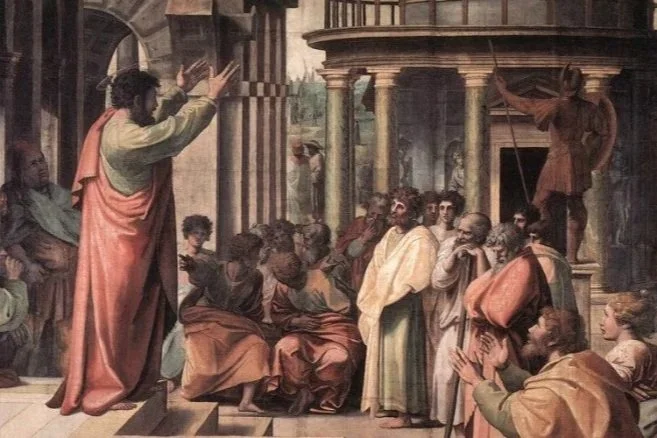Justified by What? Luke 18:9-14
To some who were confident of their own righteousness and looked down on everyone else, Jesus told this parable: “Two men went up to the temple to pray, one a Pharisee and the other a tax collector. The Pharisee stood by himself and prayed: ‘God, I thank you that I am not like other people—robbers, evildoers, adulterers—or even like this tax collector. I fast twice a week and give a tenth of all I get.’ But the tax collector stood at a distance. He would not even look up to heaven, but beat his breast and said, ‘God, have mercy on me, a sinner.’ I tell you that this man, rather than the other, went home justified before God. For all those who exalt themselves will be humbled, and those who humble themselves will be exalted.” (NIV)
Jesus addressed this parable “to some who were confident of their own righteousness and looked down on everyone else” (v. 9). The story is about two completely different men—a Pharisee and a tax collector—who went up to the temple for the daily prayer, which took place at 9:00 a.m. and 3:00 p.m. (v. 10). The Pharisees were a Jewish sect that probably emerged in the second century BC and emphasized piety, purity, and strict adherence to the Law of Moses. Over time, however, a spirit of superiority and contempt for the common people developed among them. Tax collectors, on the other hand, were impious Jews serving the Roman Empire, for whom they collected taxes indirectly. That is, they paid the Roman authorities in advance the taxes imposed on a certain city or region, and then they recovered the money by charging the people whatever they wanted, ensuring large profits in the process. As expected, they were hated and referred to as “sinners.”
Anyway, what these two men said in their respective prayers was really the truth. It was true that the Pharisee was not a thief and did not commit injustice or adultery, “like the others.” It was true that he fasted more than the Law required (twice a week) and gave tithes of all his income (vv. 11-12). Yes, he was not like the tax collector. He was religiously and morally superior to him, felt proud of himself, and thanked God for it loudly from a prominent place in the Temple.
It was also true that the tax collector was a sinner and felt guilty and ashamed of his spiritual condition. For that reason, from a dark and inconspicuous place he did not dare to lift his head or his hands, but instead he beat his breast—a visible sign of contrition—saying, “God, have mercy on me, a sinner” (v. 13). The expression “have mercy”—in the original language—is connected with the sacrifices offered on the Day of Atonement (Hebrews 2:17). The tax collector was asking God to accept his sacrifice and forgive his sins.
So, Jesus’ assessment of these two men at the end of the parable must have left his disciples and all who heard him speechless:
“I tell you that this man, rather than the other, went home justified before God. For all those who exalt themselves will be humbled, and those who humble themselves will be exalted” (v. 14)
The expression “rather than the other” (v. 14a) means that the Pharisee was not justified, despite his personal righteousness and religiosity, and that only the tax collector received God’s forgiveness, despite his injustice. The future tense of the verbs in the second part of v. 14 indicates that Jesus had in mind the eschatological judgment, when God will humble the proud and exalt the humble.
Joachim Jeremias says that the tax collector’s prayer is reminiscent of Psalm 51:1: “Have mercy on me, O God, according to your unfailing love; according to your great compassion blot out my transgressions.” He also says that, in that same Psalm (v. 17), we find an explanation of how God’s forgiveness works: “My sacrifice, O God, is a broken spirit; a broken and contrite heart you, God, will not despise” (NIV). I like the New Living Translation wording of this verse: “The sacrifice you desire is a broken spirit. You will not reject a broken and repentant heart, O God.” Yes. A broken and repentant heart is what prompts God’s forgiveness.
This is the lesson we must learn. The gospel is good news for those who recognize themselves as sinners, not for those who trust in their own righteousness. The former repent, confess, and beg for mercy, and God hears and covers them with His grace. The latter boast about their performance, compare themselves to their brothers to feel superior, and appeal to their credentials as a means of justification, but God does not take pleasure in them.
Several years ago, I gave a lecture at a local congregation on the topic of salvation by grace. During a break, one of the event organizers took me aside and said, “If good works and personal righteousness don't save, what motivation would I have for not being unfaithful to my wife or getting drunk every weekend? Why would I give up the pleasures of the world?” His response filled me with sadness and concern because I realized that more often than we think, there is a legalistic understanding of salvation among many. Sanctification is the consequence and effect of justification; not the other way around.







